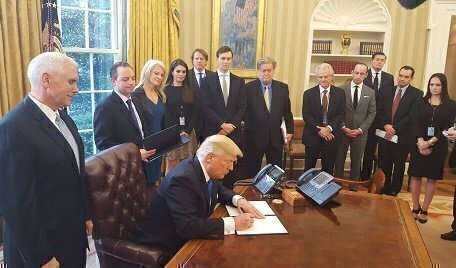Setting the stage for the Supreme Court to make up its mind quickly about President Trump’s controversial curb on immigration, Administration lawyers submitted their final written arguments at midday Wednesday. In a new legal point, they sought to rely on a two-day-old ruling by the Justices to support their claim for vast power for the White House in national security actions.
 The new brief also argued that, unless the court acts right away to permit enforcement of the executive order that Trump issued on March 6, the government’s ability to protect the nation from threatening foreigners will be hampered even if the government is able in the meantime to develop new procedures for “vetting” travelers heading for the U.S.
The new brief also argued that, unless the court acts right away to permit enforcement of the executive order that Trump issued on March 6, the government’s ability to protect the nation from threatening foreigners will be hampered even if the government is able in the meantime to develop new procedures for “vetting” travelers heading for the U.S.
That argument was meant to counter claims by the challengers to the Trump order that the President himself has undercut his national security argument by going ahead with the new vetting reviews even though his curbs on entry by foreign nationals and refugees remain blocked by lower court rulings against enforcement of the 90-day and 120-day suspensions on entrants. In his March order, the President had said the suspensions were essential to allow the development of new vetting mechanisms to ferret out travelers who might bring terrorism to this country.
As in all of the Administration’s filings throughout the nearly five-month-long constitutional battle over the Trump plans to limit immigration of foreign nationals from six Mideast nations and limit entry of refugees, the final brief made a fervent plea for the court not to second-guess the Chief Executive’s decision that he needed to do what he did to protect national security. The courts, it has argued, have almost no authority to review presidential decisions when those are done to control who may enter the country, and no authority to do so when immigration is limited for national security purposes.
This time, the brief sought to bolster that claim by quoting passages from a decision that the Justices had issued on Monday, barring money damage lawsuits against former top Justice Department officials for their actions toward immigrant Muslims in the wake of the terrorist attacks on September 11, 2001.
“As this court reiterated only days ago,” the new filing said, “‘national security policy is the prerogative of the Congress and President’ and ‘judicial inquiry into the national-security realm raises concerns for the separation of powers in trenching on matters committed to the other branches.’ ”
Further, it quoted from that opinion, courts “accord ‘deference to what the Executive Branch has determined is essential to national security.’”
The fact that those remarks were made by the court even as the Justices were preparing to weigh what to do about the Trump immigration restrictions was a coincidence, even if a welcome one for the Administration. The court releases opinions in argued cases as soon as they are ready; the Justices have been working on the decision released Monday since a hearing in mid-January.
On the Trump executive order, the Justices are now faced with a series of issues: will it put on hold lower court orders blocking key parts of the Trump order, thus allowing them to be enforced immediately; will it agree to review one or both of the government appeals defending the order – one from Hawaii, the other from Maryland; will it decide on a timetable for review if it agrees to go ahead with it; or will it find a way to bring the whole controversy to a swift end before the Justices begin their summer recess, imminently?
The Justices may act on the enforcement issue separate from the grant-or-deny review question, or it may act on them simultaneously. With all of the legal filings now in hand, the Justices will be able to act just as soon as they decide what to do.
They are scheduled to release opinions Thursday morning, but that activity may be confined only to previously argued cases; there are 12 of those remaining to be decided. But the option is also open to the court to announce at that public setting some or all of what it will choose to do on the immigration question.
Legendary journalist Lyle Denniston is Constitution Daily’s Supreme Court correspondent. Denniston has written for us as a contributor since June 2011 and has covered the Supreme Court since 1958. His work also appears on lyldenlawnews.com.






